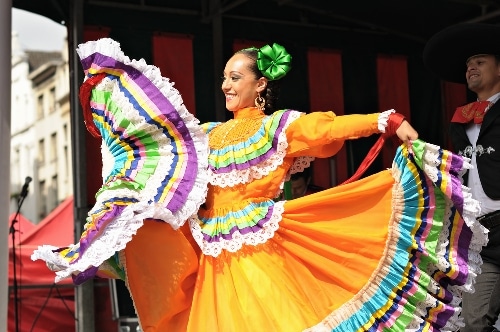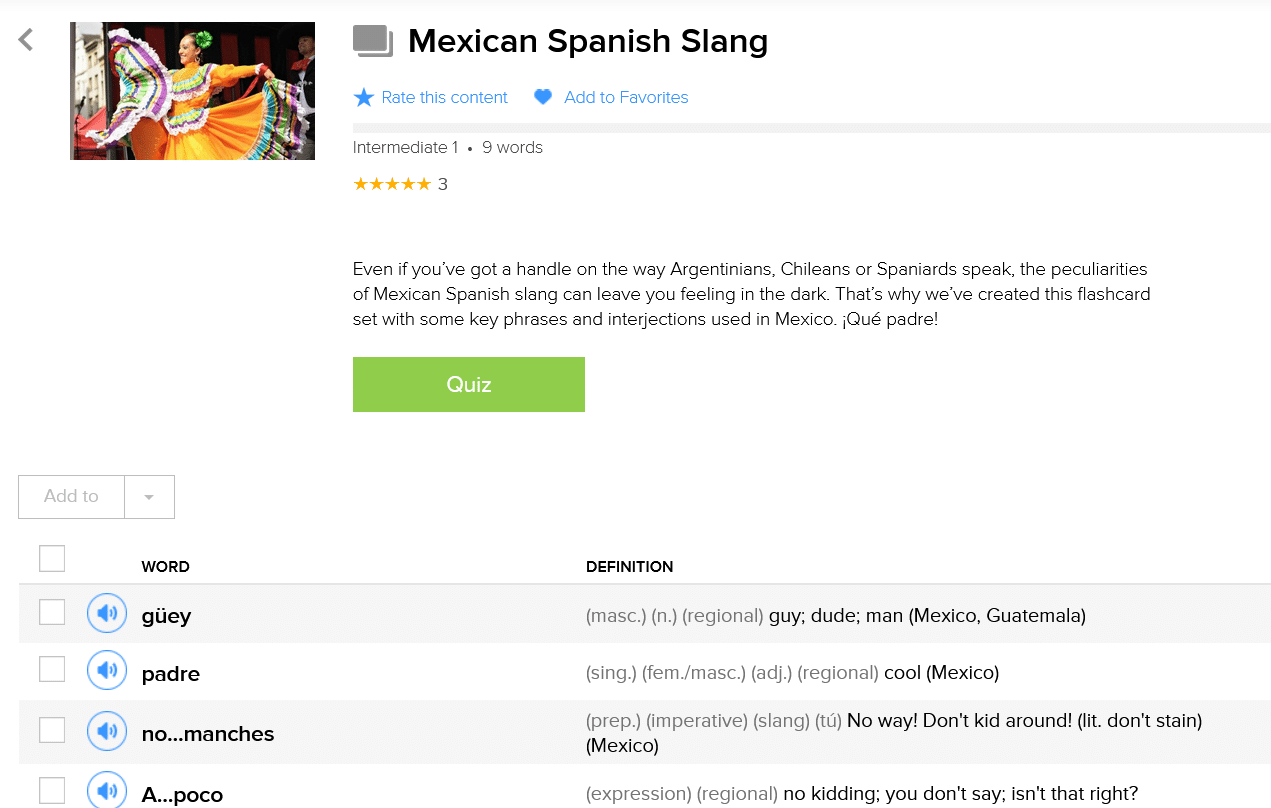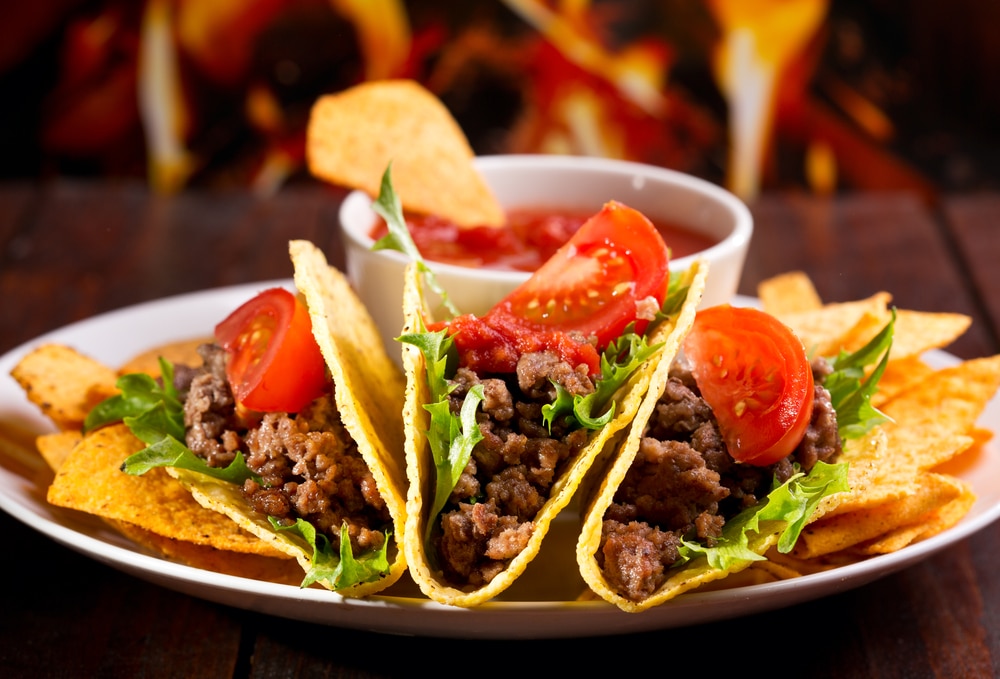Funny Mexican Words of the Day

40+ Mexican Spanish Slang Terms and Expressions to Sound Like a True Mexican
Looking to have a huge head start when you travel to Mexico?
You've gotta learn the slang.
In this post, I'm going to give you a brief introduction to the country's unique version of Spanish—and by the time we're done, you'll be able to understand a slang-filled conversation between two Mexicans.
Contents
- Some Basic Information on Mexican Spanish
- Resources for Learning Mexican Slang
-
- "Quick Guide to Mexican Slang"
- FluentU
- "Mexislang"
- Na'atik Language and Culture Institute
- Mexican Spanish Slang About… My Parents?
-
- 1. ¡Qué padre!
- 2. Me vale madre
- 3. Poca madre
- Mexican Slang for Food and Drink
-
- 4. Fresa
- 5. ¡Aguas!
- 6. El bote
- 7. Estar crudo
- 8. ¡A huevo!
- Mexican Slang About People
-
- 9. Chilango
- 10. Te crees muy muy
- 11. Ese
- 12. Metiche
- 13. Pocho / Pocha
- 14. Naco
- 15. cholo
- 16. Güey/Vato
- 17. Carnal
- Mexican Slang for Casual Conversations
-
- 18. ¿Neta?
- 19. Eso que ni que
- 20. Ahorita
- 21. Ni modo
- 22. No hay tos
- 23. Sale
- Mexican Slang About Money
-
- 24. Coda / Codo
- 25. Tener feria
- Mexican Feel-good Slang
-
- 26. Buena onda
- 27. ¿Qué onda?
- 28. ¡Viva México!
- "Street" Slang, a.k.a. Rude and Swear Words
-
- 29. Pendejo
- 30. Cabrón
- 31. Pedo
- 32. Pinche
- 33. Verga
- 34. Chingar
- Other Classic Mexican Spanish Slang Phrases
-
- 35. ¡No manches! / ¡No mames!
- 36. Está cañón
- 37. Chido
- 38. Chulo
- 39. ¿A poco?
- 40. ¡Órale!
- 41. Chela
- 42. la tira
- 43. ¿Mande?
- Sample Slangy Mexican Spanish Conversation
Download: This blog post is available as a convenient and portable PDF that you can take anywhere. Click here to get a copy. (Download)
Some Basic Information on Mexican Spanish
Here's the good news: If you began learning Spanish in school somewhere in the United States, Mexican Spanish is most likely the style you're already familiar with.
But if you're from another part of the world or have just been studying independently, here's what you need to know:
- In Mexican Spanish, the pronoun t ú is used for the second-person familiar form. This means that Mexicans use tú as the singular "you" in informal settings, such as with friends or family. This is opposed to the pronoun vos that's used in parts of Central and South America.
- As in the rest of Latin America, the pronoun vosotros isn't used in Mexican Spanish. If you've been learning the variety of Spanish spoken in Spain, you've come to know vosotros as the familiar way to say "you" when referring to a group of people. In Mexican Spanish, this form is never used. Mexicans use ustedes even in informal settings.
- Mexican Spanish features more loanwords from English than other national dialects. In Mexico, what you do in your spare time isn't a pasatiempo but rather a hobby (pronounced with the English "h" sound!). A reality television show is simply a reality. If you're trying out a new style, you might be asked about your nuevo look… and the list goes on.
This phenomenon is due in large part to Mexico's proximity to the United States and the historic movement of citizens between the two countries.
Resources for Learning Mexican Slang
"Quick Guide to Mexican Slang"

The "Quick Guide to Mexican Slang" is a compact volume that's an ideal take-along resource. It's filled with definitions, example sentences, online links for further study and lots of relevant information about Mexican Spanish.
There are more than 500 words and phrases included in this book. Many slangy words, both old and new, are covered. It's a great way to brush up on the essentials!
FluentU

FluentU uses authentic videos from different Spanish-speaking locations with interactive subtitles to help you learn. This allows you to watch and listen to real Spanish as native speakers use it.
There's plenty of content from Mexico, including clips from Mexican shows, music videos, TED talks and more.

Videos are accompanied by accurate subtitles in Spanish and English and you can hover over any word as the video plays to see its definition, pronunciation and examples. You can also create flashcards from new words you come across, then study them with personalized quizzes. FluentU also has a premade set of flashcards of Mexican slang terms, where you can study the words and see videos where they appear.

Content is categorized by skill level, format and topic, and you can search for key words or vocabulary words to find content that suits your learning goals and interests.
"Mexislang"

"Mexislang" is the end result of a blog that was intended to teach readers about Mexican slang. It offers insight into the history of slang expressions. Additionally, there are tips for how to use each slangy word or phrase.
This is a useful guide for anyone who plans to spend some time in Mexico, perhaps on an extended visit. It's also just interesting reading for language lovers!
Na'atik Language and Culture Institute

Serious students of Mexican Spanish will find exactly what they're looking for with this Mexican language school, which offers immersive programs in both Maya and Spanish.
The option to stay with Mexican families to immerse in the language is a great way to learn about culture—including slang! But if you're not up for traveling, courses are also available in online one-on-one or small group format. Online classes focus on grammar and conversational skills, so you're sure to pick up plenty of slang along the way.
Also, they have a fantastic blog that's both informative and entertaining. History, culture, Mexican Spanish, news of the day and much more is extensively portrayed!
Got it? Now that we've got the basics out of the way, it's time to get to the heart of the matter. Let's take a look at a few prominent themes running throughout Mexican Spanish slang.
Mexican Spanish Slang About… My Parents?

Padre (father) and madre (mother) are two popular words used in a variety of Mexican Spanish slang phrases. In what seems to be a direct connection to the "machismo" that has historically pervaded Mexican culture, we can generally understand padre to be a positive word and madre to be a negative one.
Confused? Let's look at some examples:
1. ¡Qué padre!
This phrase's literal translation, "How father!", doesn't make much sense at all—which will, of course, become a running theme in an article on slang.
That said, it can be understood to mean "Cool!" or "Awesome!" and is without a doubt one of the most commonly used phrases punctuating day-to-day Mexican Spanish.
2. Me vale madre
Translated literally as, "It's worth a mother to me," this phrase is used to say "I don't care" or "It doesn't matter to me at all." It's not quite a curse, but it can be considered offensive in more formal situations.
3. Poca madre
Literally translated as "little mother," this is sort of an inversion of the "mother" theme. Because it's only a little bit mother, this phrase is used to describe something really cool. Once again, this phrase can be considered offensive and is mostly used among groups of young men.
Though every Mexican has a different take on things, the gender-loaded nature of these slang phrases is beginning to come under a bit of scrutiny in modern Mexico.
The use of padre is generally fine, but many women (and some men) do take offense at the negative use of the word madre and its linguistic relatives. It's good to understand how the word is used, but it's probably best to avoid using it yourself.
Mexican Slang for Food and Drink

Mexican Spanish slang uses several words normally related to food and drink to mean other things entirely.
4. Fresa
Literally a "strawberry," a fresa is not something you want to be.
Somewhat similar to the word "preppy" in the United States but even more negative in its connotations, a fresa is a young person from a wealthy family who's self-centered, superficial and materialistic.
5. ¡Aguas!
This phrase is used throughout Mexico to mean "Be careful!" or "Look out!" Literally meaning "waters," it's possible that this usage evolved from housewives throwing buckets of water to clean the sidewalks in front of their homes.
6. El bote
The wordbotemeans "can" (as in "a can of soda"). However, when a Mexican says someone is"en el bote,"they mean someone is "in the slammer," "in jail."
7. Estar crudo
Estar crudomeans "to be raw," as in "food that hasn't been cooked." However, if someone in Mexico tells you they're crudo, it means they're hungover because they've drunk too much alcohol.
8. ¡A huevo!
Huevos (eggs), it must be said, make up an entire family of Mexican Spanish slang. They're often used to denote a specific part of the male anatomy—you can probably guess which—and they're also used in a wide variety of slang phrases.
¡A huevo! is perhaps the most popular one, and it's basically a vulgar way to show excitement or approval. Think "Eff yeah!" without the self-censorship.
Mexican Slang About People
9. Chilango
This slang term means something, usually a person, who comes from Mexico City. Calling someone a chilango is saying that they're representative of the culture of the city.
There's ambiguity surrounding this expression. Many slang terms aren't clear-cut, and this is an example of that issue. While some say it applies to those born in Mexico City, while others insist it's a term for those who move to the city. The "Mexico Daily News" explains it from every side—and there's still a bit of mystery about the term.
However one arrives in the city seems inconsequential. The fact remains that the slangy term refers to those who call the beautiful capital their home.
10. Te crees muy muy
This literally means "You think you're very very" but the slang meaning is more of "You think you're something special."
Often, this is used to power down someone who's boastful or thinks they're better than anyone else. It's a take-down that isn't insulting.
Or, if someone thinks they're doing something incredibly well—and they make it clear that no one else can come close to their perfection—a person might hear "Te crees muy muy."
11. Ese
I was very surprised to see that there are a ton of Spanish learners who ask the question, "What do gangsters call each other in Mexico?"
Well, long story short, they call each otherese.
In the 1960's, a well-known Mexican gang called the Sureños("Southerners") arrived in California. It's said that members of this gang called each other by just the first letter of the gang name: "S," pronounced "ese" in Spanish. The term stuck and the word (or rather, letter), has remained in the language ever since.
However, in the '80s, the word esestarted to be used to refer to men in general.
Remember we have the demonstrative ese ("that one") in Spanish. It's very possible that the esefromSureñosgot mixed with theesein expressions likeese vato ("that guy"), and from that, the wordese started to be used to refer to a man.
So, if you hear,"¿Qué pedo, ese?"somewhere in Mexico, just know they're saying "What up, dawg?"
12. Metiche
Metiche is a slang word for someone who loves to get the scoop on everyone's everything. It's a person who makes it his business to find out everyone else's business.
The metiche isn't usually a blabbermouth—just a person with an urgent need to know. Some people would refer to this sort of person as a busybody!
13. Pocho / Pocha
This Mexican slang term refers to a Mexican who's left Mexico or someone who's perhaps forgotten their Mexican roots or heritage.
This is one of those two-sided slang words. In some instances, it can be used as just an observatory expression. In that instance, it may mean that a generation isn't as culturally observant as a previous generation. I've heard grandchildren use this term when trying to explain to a grandmother why buying tortillas is simpler than making them the old-school way.
But this can also be a derogatory slang word if it's used to point out that someone's at fault for not remembering their heritage.
So it's best to consider the context when contemplating using this slang term. Or if you hear it in conversation, remember that it has more than one meaning.
14. Naco
Naco is a pejorative word you'd use in Mexico to describesomeone or something poorly educated and bad-mannered. The closest American equivalent would be "tacky" or "ghetto."
Anaco is considered to have bad taste and be classless. Though it's starting to become reclaimed by modern Mexican culture, the word has its origins in insulting indigenous and poor people, so many still find it offensive. Be careful with this word!
15. cholo
Although the wordcholocan refer to different people and can have several meanings (some more derogatory than others), it often refers to Mexican gangsters, especially Mexican American teens and youngsters who are in a street gang.
In South America, the term is actually used to mean something completely different: a person of indigenous descent. Latino USA has some interesting interviews with the two types of cholos, if you're curious to learn more.
16. Güey/Vato
I've also seen this one written as wey and even buey in older sources, but it's generally accepted that güey is the way to go. No matter how you write it, it's basically pronounced like the English word "way" and it's one of the most quintessential Mexican slang words.
Originally used to mean "a stupid person," the word eventually morphed into a term of endearment similar to the English "dude." It's also one of those strange words that can be used to insult a friend in an endearing manner if you've seen them do something silly or stupid.
The same can be said about the word vato(and alsobato, both spellings are correct). In the northern parts of Mexico, you can use it to refer to someone as "dude," "homie" or "bro."
Being the shortened form of the word chivato("snitch," "informant"), vato is quite often associated with a "bad-guy vibe" kind of meaning, so it can be used to refer to someone in a derogatory way.
When used to refer to a woman, a vata can just be a "chick," or she can be a female prostitute who owes someone money.
In other words, when in doubt, use güey. It's understood throughout Mexico!
17. Carnal
Carnalcomes from Spanishcarne(meat). It's perhaps for this reason that carnalis used to describe a close friend who's like a brother to you, carne de tu carneor flesh of your flesh.
If you say someone is yourcarnal, they're like part of the family.
Mexican Slang for Casual Conversations

18. ¿Neta?
"Truth?" or "Really?" is what someone's saying when they use this little word. It's so commonplace that I've heard toddlers use it!
This is a popular conversational interjection. It's used to fill a lull in the chatter or to give someone the opportunity to come clean on an exaggeration. Oftentimes, though, it's just said to express agreement with the last comment in a conversation.
It can also be a way to clarify something. If confirmation of a point is needed, ¿Neta? is the expression to use.
19. Eso que ni que
There's no real literal translation of this expression that makes any sense in English. But as Mexican slang, this convenient little phrase means that you're in agreement with whatever's being discussed, that there's no doubt about it. It's another conversational gem that can be useful as a filler expression.
So if someone expresses an opinion that's similar to your own or proposes an arrangement or activity as a worthwhile endeavor, you can say "Eso que ni que" to show that you agree.
20. Ahorita
This translates as "little now" but the small word means right now, or at this very moment.
If someone asks if you're ready to go out, ahorita is an appropriate reply.
When do you want your dinner? "Ahorita."
Also, it's possible to say ahorita even when you're not quite meaning right this very minute. For example, if you're just a few minutes from being ready to walk out the door but the person who's waiting for you is a tad impatient, sweetly calling "¡Ahorita!" from the other room might gain you a few extra minutes!
21. Ni modo
Ni modo, which can be literally translated as "not way" or "either way," is possibly one of the most popular Mexican expressions, and I'm sure you'll start adding it to your convos pretty soon.
Ni modois generally used to basically say "eh, whatever" or "it is what it is." It's a bit fat "oh well"!
The phrase is used to show that you're resigned to whatever is happening or being said.
For example, if your partner breaks up with you, your carnalcan tell you, "Ni modo, hay mejores chicas/chicos en el mundo" ("Oh well, there are better girls/guys in the world").
You can even add the wordya("already") to give emphasis to what you're saying, "Olvidé mis libros. Ya ni modo, ahorita voy por ellos" ("I forgot my books. Oh well, I'll go get them in a sec").
Ni modocan also be used withque(that) and a present subjunctive to say you can't do something at the moment or there's no way you'd do it. It's like saying "there's no way" or "are you nuts?" in English.
If it's midnight and your phone rings but you don't feel like talking, you can say, "Ni modo que conteste, güey"("There's no way I'm answering, man").
22. No hay tos
I discovered this Mexican expression while doing research for another post, and now I'm on a mission to teach everyone what it means and how to use it. Even outside of Mexico!
No hay tosliterally means "there's no cough," but it's used to say "no problem" or "don't worry about it."
As an expression, it makes no sense until you think of a doctor-patient situation. The doctor says: "If there's no cough, you don't have to worry." There you have it! No cough = No worries!
Imagine a situation where your friend asks for a few coins to buy something to eat but you have no money at the moment. He asks, "¿Tienes feria?("Do you have any money?"—See number 25 for more about feria), but you have nothing, so he tells you, "No hay tos, comeré en la casa"("No problem, I'll eat at home").
23. Sale
Saleis the third person singular of the present indicative of the verbsalir("to go out"). In other words, it means "he/she/it goes out."
However, you can use it in Mexico to say much more than just that.
You may have heard the expressions vale(from the verbvaler — to cost, to be worth) or dale(for the verbdar — to give), both meaning "OK," "sure," "yeah" or "let's do it."
Saleis just their Mexican counterpart, so it's normally used in situations when someone suggests doing something and you agree.
For example, if your best friend asks you to go to a concert with them, you can say,"Sale, pero tendrás que prestarme lana"("Sure, but you'll have to lend me some money").
Sale can also be used as a question tag when you want to know someone's opinion or want to see if they're on the same page you are:"Ya vámonos, ¿sale?"("Let's go already, shall we?").
Mexican Slang About Money

24. Coda / Codo
Codo literally means "elbow" in English but Mexican slang has turned it into a term used to describe someone who's cheap. It can be applied to either gender, so pay attention to the -a or -o ending of this descriptive noun.
If you're spotted in public being tight-fisted or exceptionally frugal in the market, you might hear this word!
25. Tener feria
Feria means "fair" so the literal translation of this expression is "to have or be fair." However, feria also refers to coins when it's used in Mexico. So, the phrase basically means "to have money" or "to have pocket change."
If you're able to go have fun with your friends without having to take a loan or plead poverty, you can answer in the affirmative if you're asked, "¿Tienes feria?" ("Do you have money?").
The amount of money is small but the intention to have fun is large when this little phrase is passed around!
Mexican Feel-good Slang

26. Buena onda
Buena onda literally translates to "good wave" but it's used as a slangy expression to indicate that there are good vibes or a good energy present.
I have to admit, this is my favorite Mexican slang expression. Use it to elicit more smiles and good vibes than almost any other word in my vocabulary! Try it—you'll see what I mean!
27. ¿Qué onda?
This slangy Mexican expression translates to "What wave?" but is a cool way to ask "What's up?"
It's similar to buena onda since the wave is mentioned again! It's another feel-good, casual conversational expression that really adds a lot of good feelings to any chat.
28. ¡Viva México!
Cultural love is evident across the globe and Mexicans have no shortage of pride in their beautiful country.
¡Viva México! literally means "Long live Mexico!" It's the unifying phrase that applies to everything Mexican. It's a way of saying that the country should grow, prosper and see happy times for its citizens and visitors. It's often shortened to "¡Viva!" which means the same as the full phrase.
Visitors and citizens alike can use this sweet bit of slang—it's welcome everywhere in Mexico and will certainly bring favorable reactions!
"Street" Slang, a.k.a. Rude and Swear Words

WARNING! The following words can be considered rude by many people. Some of them are swear words. Please, bear in mind they can sound very impolite in some contexts, so use them with caution. If you prefer to keep things clean, just skip this section, por favor.
29. P endejo
Pendejo is one of those magical words that appear in almost every Spanish variety but have a different meaning depending on where you are.
Originally, the word was used to refer to your hair down there. No wonder it was so easy for it to get all kinds of weird meanings and connotations.
When you use it in Mexico, it has a rather rude meaning: "unpleasant or stupid person," "jerk."
It's one of those words you can use with friends in an endearing way but also with other people when you're trying to be offensive.
It all depends on the way you use it.
If you tell your friend,"Cállate, pendejo" ("Shut up, jerk") with a smile when they start telling your crush you love them, you'll both laugh and remain friends. If you use the same words with your boss during a work meeting, you'll probably get fired immediately.
30. C abrón
The wordcabrónmeans "billy goat." If you know the wordcabra(goat) and the augmentative suffix -ón, you can see right away that it literally means "big [male] goat."
When used as a rude word, its meaning is quite similar to pendejo, but cabrónis higher in the rudeness scale, and is vastly more versatile.
If you call a man a cabrón, you might be saying that they're unpleasant, mean or not very bright. Change the tone a bit and you might, instead, be saying they're awesome.
On the other hand, you could also be implying that his wife is cheating on him (and he, quite possibly, knows about it and does nothing).
You can also use this word more playfully with friends (so endearing, isn't it?), something that happens in other countries like Spain as well.
The word can even be used in place of the f-bomb, very often following bien—very, to mean you're really freaking awesome at doing something. For example: "Soy bien cabrón jugando a Minecraft"(I'm friggin' awesome at playing Minecraft).
31. P edo
Apedois a fart, literally.
This isn't the rudest word on the list, but it's funny enough to deserve a place here.
When you say someone ispedo, you're not saying they're a fart, you're actually meaning that they're drunk:"Estoy bien pedo"("I'm very drunk"). The drinking session where they got drunk is called apeda.
If someone isbuen pedo(a good fart), it means they're giving off good vibes, like buena onda. Conversely, mal pedo (a bad fart) is someone who is mala onda or unfriendly/hostile.
You can also use this word to ask,"¿Qué pedo?"This can be translated as a very informal "What's up?"
However,pedo can also mean "problem" or "argument," so the same question "¿Qué pedo?"can also be used to mean "What's the problem?" with an accusatory tone, as in,"¿Qué pedo contigo, cabrón?"(What's your problem, man?).
Related to this, you can say"ponerse al pedo"(literally, "to put oneself to the fart") when you want a fight or have an attitude of defiance.
32. P inche
The wordpinchemay sound quite unproblematic for many Spanish speakers because it literally means "kitchen helper."
However, when in Mexico, this word goes rogue and acquires a couple of interesting meanings.
On the one hand, it can mean "ugly," "substandard," "poor" or "cheap." If you live in una pinche casa, you basically live in a shoddy house.
On the other hand (this will be your favorite),pinchecan be used as an all-purpose enhancer, much like the meaner cousin of "hecking" is used in English. So, if you want to say someone is effing crazy, you'll just call them pinche loco/loca.
33. Verga
Originally, thevergawas the horizontal beam from which a ship's sails were hung.
If you have a look at the shape, it's no wonder this word has come to mean a man's shlong in Spanish nowadays.
However,vergais much more than just a peepee.
For starters, you can use this word as a standalone exclamation with the meaning of the f-bomb.
If this isn't enough, please know you can also use it to mean that someone thinks they're all that, as in "Antonio se cree muy verga porque tiene una vata"("Antonio thinks he's cool stuff because he has a girl").
Next, you can say that something (or someone, or even a situation) vale verga("it's worth a pecker"), with the meaning of "it's worthless."
Last but not least, you can kindly tell someone, "Vete a la verga" (literally, "go to the willy"). This is just a "lovely" way of telling someone to eff off.
34. Chingar
I've left the wordchingar for last because it seems to be not only the most commonly used verb in Mexico, but also the most multi-purpose word you could ever imagine.
Chingarmeans "to do the deed." It's Mexico's version of the f-word. Simple.
But the fun starts when you see this verb and all its family be used in a zillion dirty and not-so-dirty expressions. I wouldn't dare reproduce in this post all the rude content this cute word can offer, so I kindly ask you to check the link I just gave you.
Chingar is a word that's prevalent in Mexican culture in its various forms and meanings. If you find yourself using it in your everyday conversations, then you've achieved the level of mastery in Spanish that'd make native Mexican speakers proud.
And if you're an advanced Mexican speaker who wants to refine the art of using chingar, or even a beginner or intermediate Spanish learner with a lot of curiosity and a good dictionary, I invite you to read the masterpiece"El Chingonario," which is a dictionary including only the word chingar and all its uses ("The Fudge-ionary," if you will).
Other Classic Mexican Spanish Slang Phrases
These are the slang phrases that don't really fall into any specific "category," but are used popularly nonetheless.
35. ¡No manches! / ¡No mames!
These two phrases are essentially one and the same, hence why they're grouped together. Literally meaning "Don't stain!" and "Don't suck!", respectively, they're used typically in conversation to express a sentiment of "No way! You're kidding me!" or in less friendly situations, "Don't mess with me!"
No manches is totally benign, but no mames is considered vulgar and can potentially be offensive.
36. Está cañón
When you say that somethingestá cañón(literally, "it's cannon"), you're saying "it's hard/difficult."
For example, you can say,"El examen estuvo bien cañón" ("The exam was very difficult").
Some believe that the phrase arose as a more polite euphemism for está cabrón.
As a Spaniard, I find this meaning quite funny, becauseestar cañónmeans "to be very attractive" in Castilian Spanish.
37. Chido
This word is simply a fun way to say "nice" or "cool" in Mexican Spanish. Despite its status as slang, it's not vulgar or offensive in the least—so have fun with it!
It can be used as both a standalone exclamation (¡Qué chido! — Cool!) or as an adjective (un carro chido — a cool car).
38. Chulo
Chulois another word tht can have several meanings depending on the country you use it and the intention you have.
When it comes to Mexico, it's used as an adjective to refer to people you find hot, good-looking or pretty (chula for women).
You may have heard the expression papi chulo ("hot papi," "hot man") a thousand times, especially if you know Lorna's song by the same name.
You can also use it to refer to things with the meaning of "cute," as in "Tu camisa es chula"(Your shirt is cute).
However, if you happen to travel to Spain, don't use this word to refer to people, since a chulois "a pimp."
39. ¿A poco?
There's no way to translate this one literally, it just comes back as nonsense. Mexicans, however, use it to say "Really?" when they're feeling incredulous.
40. ¡Órale!
This exclamation basically means "Right on!" or in some situations is used as a message of approval like "Let's do it!"
Órale is another Mexican slang word that's considered inoffensive and is appropriate for almost any social situation. Has your friend challenged herself to shoot a basket from the free-throw line, while blindfolded? Give her a hearty "Órale!" to cheer her on.
It can be said quickly and excitedly or offered up with a long, drawn-out "o" sound.
41. Chela
Simple enough, chela is a Mexican Spanish slang word for "beer."
In other parts of Latin America, chela is a woman who's blond (usually with fair skin and blue eyes). No one is quite sure if there's a link between the two, and it seems unclear how the word came to mean "beer" in the first place.
Just know that if you have a relative who everyone calls Chela and she has dark hair and no special affinity for beer, then her full name might just be Marcela or Graciela—as Chela is also a common nickname for those two names!
42. la tira
A tirais a "strip," but when you use it as a Mexican slang word, you mean "the fuzz," "the cops."
For example, "¡Aguas! ¡Ahí viene la tira!" (Watch out! The fuzz are coming!)
43. ¿Mande?
Perhaps not slang technically, this word is uttered daily all across Mexico and we couldn't leave it off the list! It's literally the formal imperative form of the verb mandar (to command), perhaps ironically commanding someone to command you.
However, it's used in Mexico in place of ¿Qué? or ¿Cómo? to respond when someone says your name. I've heard it explained that this response is a legacy of the especially brutal Spanish colonial era in Mexico, when people were forced to act with extreme deference to their superiors.
Sample Slangy Mexican Spanish Conversation

So, what do you know… that's the end of the list! Remember how I said you'd be able to understand a full conversation after reading this post? Let's take a look at one:
Oye, ¡José! (Hey José!)
¿Mande? (Yeah?)
¿Quieres ir a ver esa nueva película esta noche? Me dijeron que es bien chida. (Do you want to go see that new movie tonight? I heard it's really cool.)
¿A poco, güey? No manches… Escuché que es muy mala. (Really, dude? No way… I heard it's terrible.)
Bueno pues… ¿vamos pa' unas chelas? (Alright then… How about we go out for some beers?)
¡Órale! Mejor eso. Nos vemos entonces. (Right on! That's more like it. See you then.)
It makes a lot more sense now than it would have at the start, doesn't it?
Now that you're getting pretty well acquainted with Mexican Spanish, we also recommend you try out Gritty Spanish for realistic and fun audio learning. This is a program that's not afraid to be bold, using vulgarity, curses and slang in their educational dialogues. And they often include the voices of native Spanish speakers from Mexico, who use their Mexican accents and slang to the max.
Assuming you're all grown up and not opposed to offensive language, take it for a spin—they have free material on their site which you can sample.
Then get out there and start speaking some real Mexican Spanish!
Mexican slang is colorful, descriptive and wonderfully useful. These fun words and phrases are perfect for instantly turning "program" Spanish into street Spanish. More importantly, they offer insight into some cultural nuances that language learners don't always get to see.
Use slangy terms to power up conversations and go from basic to vivid in a heartbeat!
Francisco J. Vare loves teaching and writing about grammar. He's a proud language nerd, and you'll normally find him learning languages, teaching students or reading. He's been writing for FluentU for many years and is one of their staff writers.
Jim Dobrowolski is a freelance writer, a passionate language learner and the proud husband of a dentist from Mexico. When he's not working or blogging at Spanish Learner Central, he might be found strumming a guitar, climbing a small mountain or exploring his newly adopted hometown of Buffalo, New York.
Download: This blog post is available as a convenient and portable PDF that you can take anywhere. Click here to get a copy. (Download)
harveyollourety1976.blogspot.com
Source: https://www.fluentu.com/blog/spanish/mexican-spanish-slang/
0 Response to "Funny Mexican Words of the Day"
Post a Comment